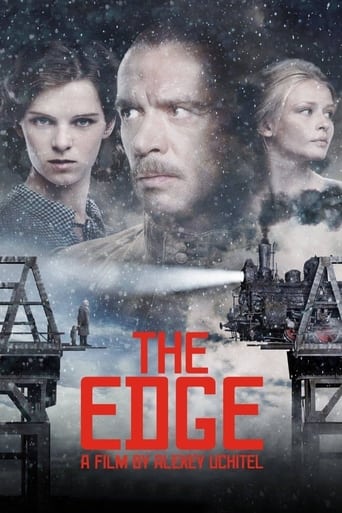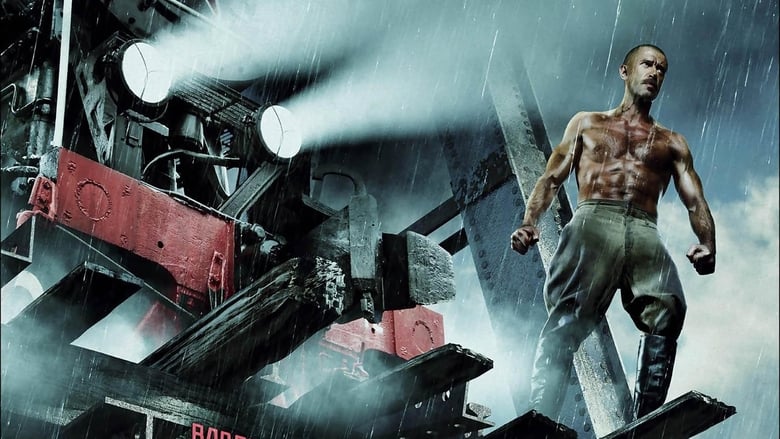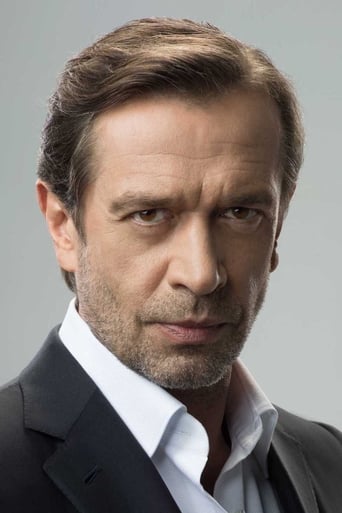

The Edge (2010)
The action takes place shortly after the end of the Second World War in the Siberian hinterland, among Russians and Germans with damaged personal stories and a strange transformation: the victors seem to be crawling into the skins of the defeated, and vice versa. Ignat, is the embodiment of the larger-than-life image of the Soviet victorious warrior who, in fact, proves to be shell-shocked, sick and broken, although not completely destroyed. Trains become fetish for the heroes of the film, and speed becomes a mania; they virtually become one with their steam engines, while the machines take on human names. The heroes set up an almost fatal race in the Siberian forest, risking their own lives and those of others.
Watch Trailer
Cast


Reviews
This film clearly aims to present the immediate post-WWII Russian/Soviet landscape in a way that is not breathtakingly new, but satisfyingly authentic for middlebrow audiences, East and West. In this way, it reminds most of the Finno-Russian production, "The Cuckoo." The heroes are not larger than life, no better than they need to be (when the Russian heroine is asked why she prefers the newly arrived hero to her former lover, she answers, "because he has more of the devil in him"); the national prejudices create tension, project an atmosphere of cruelty, even brutality among characters who clearly have a stake in reaching mutual understanding. The cold is palpable, as is the primitive living conditions. No wonder the power and beauty of the locomotives provide romanticism and sense of adventure for all.A large part of the suspense comes from just trying to figure out the back story and the relationships among the characters. The political atmosphere is understated enough, I think, so thoughtful audiences have something to "read between the lines," and those who want an adrenaline rush will not be disappointed.
Saw the film last night at the Aero Theater in Santa Monica as part of a special Golden Globe viewing. The subject matter of German/Russian relationships, especially during WWII were some of the darkest moments in either countries histories, so this is not an easy subject for film. I was expecting something dark and brutal, which was not the case. This film utilizes black humor very well, akin to the Czech Film Divided We Fall, but it is not a comedy. The relationship between Germany and Russia before, during, and after WWII, including what the governments want us to believe is skilfully examined via the universal truths of the human experience of the characters in the film. Although this is a Russian film, this does not mean the film is any less relevant to a German audience. You do not need to know a lot of Russian German History to understand the film, but there is one key date you do need to know, that is June 1941, when Germany broke the alliance with Russia and invaded. Great film, hope it wins.
I will not get into details about the movie itself - I like it a lot obviously. I will just try to answer some of the questions raised by some of the people that gave relatively low grade as they obviously did not understand a lot about the movie (probably due to bad subtitles or lack of enough attention) which I, being someone with good understanding in Russian and having quite good Bulgarian subtitles, have noticed: -This is not a Gulag! This is free labor camp - much different. People there are not imprisoned, are being cared about (clothed, fed relatively good and not harassed to death) while working for the state for something (wood harvesting and transporting I think). The idea is there the "spoiled" collaborationists to be reformed in the right attitude and habits for the "new" society.There is a train in the camp as this is the end of the railroad, this is the last station (hence the pun in the title "Kray" which in English means "End"). The locomotive is needed for keeping the railroad clean from snow during the winter and for transporting the harvested wood (second clearly seen in the movie and the first also explained in the film).The hitting is not without a reason, but it will take more than couple of lines to explain why for each case. Probably it is hard to understand for people that are not acquainted with the Russian/Soviet "Great Motherland war" (I am not sure if the translation is officially correct though) and the attitude of the whole nation towards the German invaders and the people who supported, helped or even tolerated them (especially men), especially from people who fought on the front."the main hero's girlfriend" is allowed separate room as she is the only one in the camp with a child - this is explicitly explained by her in the beginning of the movie and once again - this is not a Gulag! Please pay more attention before writing.About the train over the bridge - it is not something physically impossible. In fact the approach of rushing through an unstable construction instead of going slowly over it makes quite a sense - you pass through it in very short time before it has time to collapse and the inertia you have also helps. If you go slowly - you crush it under your weight.Overall, I believe that the atmosphere and the "flavor" of the time add the place is captured very well, and the characters are very realistic. I like Russian cinema a lot and probably being Bulgarian who grew during the socialist times and had to learn Russian since lower grades (now I don't regret this) helps me to understand and "feel"better their movies and what they are trying to say. So the movie for me is very, very good and kept me under it's impression for several days (still does). I highly recommend it, especially to people from Eastern Europe.I hope this review helps someone:)
You have to give credit to the director and the team of stunt-men for incredible steam engine races but on the whole the plot is not believable. The most impossible thing of course is four- year survival of a German girl in the Siberian taiga. How she did it is a mystery which I can only explain by the director's plan to shoot a prequel next year.The list goes on - the main hero's girlfriend lives in a barrack with dozens of other exiled women who all sleep in bunks in one large room but she, miraculously, has a tiny bedroom all for herself and her lover. How she pulled this one off in the Gulag, I do not know.The main hero is such a hero, he makes steam engines fly over a pretty wide river, tender and all, when he realizes that a bridge he tried to repair is unsafe for crossing.There is a fair dose of what directors - Russian or foreign ones - think should be in a film about Russia. The most glaring example in "The Edge" is a bear walking the streets of a settlement and doing mischief among the inhabitants. There is plenty of moonshine and Stalin's portraits. There is a Russian steam bath filled with naked women whose bodies look remarkably appetizing for the inhabitants of the Gulag. I was surprised that there was nobody playing the harmonica under the branches of a cranberry tree.But like I said, if you are a fan of locomotives, go and watch this movie!




